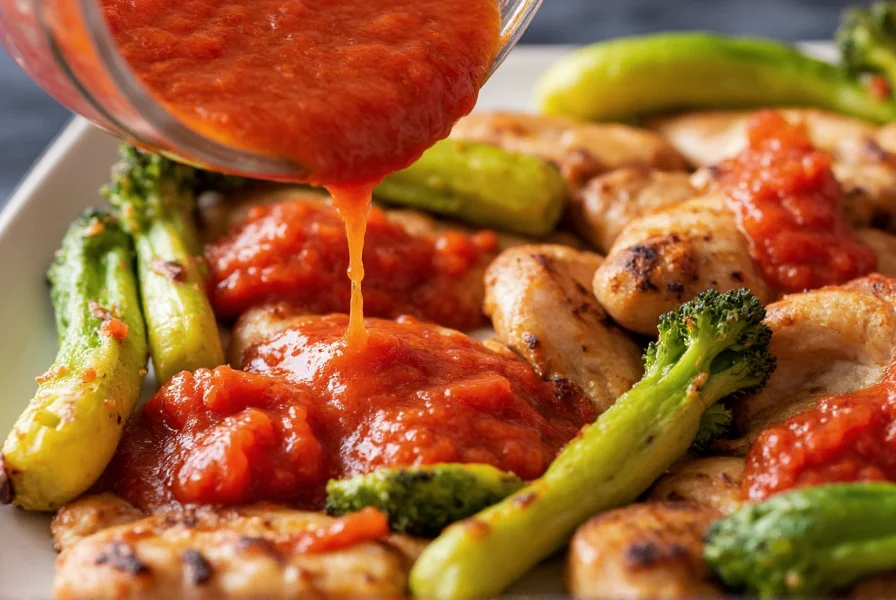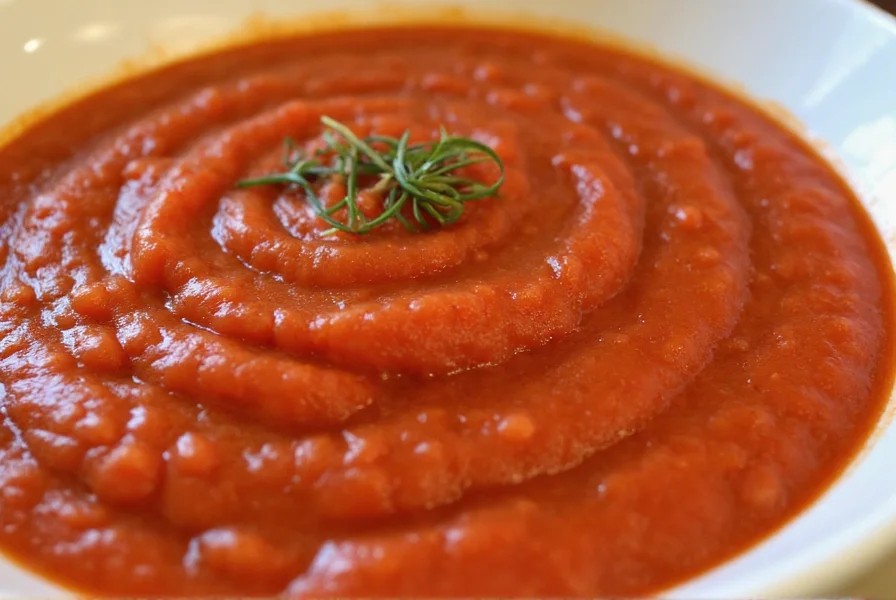Creating the perfect homemade roasted red pepper sauce starts with understanding its fundamental components and preparation techniques. This Mediterranean-inspired condiment has gained popularity across American kitchens for its adaptability in both simple weeknight meals and elegant entertaining. Unlike store-bought versions that often contain preservatives and excessive sodium, crafting your own allows complete control over ingredients and flavor intensity.
The Essential Components of Quality Roasted Red Pepper Sauce
Authentic roasted red pepper sauce relies on three critical elements: proper pepper roasting technique, balanced seasoning, and appropriate texture. The roasting process transforms sweet bell peppers through caramelization, developing complex flavor compounds that raw peppers lack. When preparing roasted red pepper sauce for pasta dishes, the sauce should coat the noodles without separating or becoming watery.
Professional chefs emphasize the importance of removing the pepper skins completely after roasting. These skins create a bitter aftertaste and unpleasant texture in the finished sauce. The optimal roasting method involves charring the peppers over an open flame or under a broiler until blackened, then sealing them in a covered bowl for 15 minutes to steam and loosen the skins.
Step-by-Step Homemade Roasted Red Pepper Sauce Recipe
This easy roasted red pepper sauce without cream yields a vibrant, dairy-free alternative that maintains its rich texture through emulsification rather than dairy products. The recipe produces approximately 2 cups of sauce with a shelf life of one week refrigerated.
| Ingredient | Amount | Preparation Notes |
|---|---|---|
| Red bell peppers | 4 large | Roasted, peeled, and seeded |
| Garlic cloves | 2 | Minced or pressed |
| Extra virgin olive oil | 1/4 cup | Plus more for roasting |
| Red wine vinegar | 2 tablespoons | Substitute lemon juice if preferred |
| Salt | 1 teaspoon | To taste |
| Fresh basil | 2 tablespoons | Chopped (optional) |
Preparation:
- Roast peppers over gas flame or under broiler, turning occasionally until completely blackened (8-12 minutes)
- Transfer to covered bowl and let steam for 15 minutes
- Peel skins and remove seeds, patting peppers dry with paper towels
- Combine all ingredients in food processor
- Pulse to combine, then process while slowly drizzling olive oil
- Continue processing until smooth (2-3 minutes)
- Adjust seasoning and texture as needed

Variations to Elevate Your Sauce
Customize your spicy roasted red pepper sauce variation by incorporating these professional chef techniques:
- Smoky Depth: Add 1/4 teaspoon smoked paprika or 1 chipotle pepper in adobo sauce
- Creamy Version: Blend in 2 tablespoons Greek yogurt or soaked cashews (for vegan option)
- Mediterranean Twist: Incorporate 2 tablespoons sun-dried tomatoes and 1 teaspoon oregano
- Extra Heat: Include 1/2 teaspoon red pepper flakes or a fresh serrano pepper
Perfect Pairings for Roasted Red Pepper Sauce
Understanding how to use roasted red pepper sauce effectively transforms ordinary meals into restaurant-quality dishes. This sauce serves multiple culinary functions beyond simple condiment status:
- Pasta Enhancement: Toss with penne, grilled chicken, and fresh spinach for a complete meal
- Breakfast Boost: Spread on toast before adding avocado or use as a shakshuka base
- Protein Marinade: Coat chicken breasts or salmon fillets 30 minutes before grilling
- Dip Foundation: Mix with Greek yogurt for a vegetable dip or sandwich spread
- Pizza Sauce Alternative: Replace tomato sauce on white pizzas with vegetables
Storage and Shelf Life Guidelines
Proper storage is essential for maintaining the quality of your roasted red pepper sauce storage tips. Follow these professional recommendations:
- Refrigerate in airtight container for up to 7 days
- Freeze in ice cube trays, then transfer cubes to freezer bags for up to 3 months
- Always use clean utensils when serving to prevent contamination
- Store with a thin layer of olive oil on top to preserve freshness
- Discard if mold appears or if sauce develops sour smell
Nutritional Benefits and Dietary Considerations
Beyond its culinary versatility, roasted red pepper sauce offers significant roasted red pepper sauce nutritional benefits. Bell peppers are exceptionally rich in vitamin C (providing 169% of daily value per cup) and contain substantial amounts of vitamins A, B6, and E. The olive oil base contributes heart-healthy monounsaturated fats that enhance absorption of fat-soluble vitamins from the peppers.
This sauce naturally accommodates multiple dietary preferences:
- Vegan and vegetarian friendly
- Gluten-free without modification
- Nut-free (unless using nut-based cream alternatives)
- Low-calorie option at approximately 45 calories per 2-tablespoon serving
Troubleshooting Common Sauce Issues
Even experienced cooks encounter challenges when preparing roasted red pepper sauce. Address these common problems:
- Watery Sauce: Excess moisture usually comes from insufficiently dried peppers. After peeling, press peppers between paper towels to remove moisture.
- Bitter Flavor: Typically caused by burned skins or over-roasting. Remove all blackened skin completely and avoid charring the flesh.
- Separation: Proper emulsification prevents oil separation. Add olive oil slowly while the processor runs, and ensure ingredients are at room temperature.
- Lack of Flavor: Under-roasted peppers won't develop sufficient sweetness. Roast until completely blackened, and consider adding a pinch of sugar if needed.
Frequently Asked Questions
Can I use jarred roasted red peppers for the sauce?
Yes, jarred roasted red peppers work well for convenience, but drain them thoroughly and pat dry to prevent watery sauce. Fresh-roasted peppers provide superior flavor depth and smokiness compared to jarred versions.
How can I make the sauce smoother without a food processor?
Use a high-powered blender for smoother results, or pass the sauce through a fine-mesh sieve after blending. For completely smooth texture without special equipment, cook the peppers longer during roasting to break down fibers more completely.
What's the best way to freeze roasted red pepper sauce?
Freeze in ice cube trays first, then transfer the frozen cubes to airtight freezer bags. This portioning method lets you thaw only what you need. Properly frozen sauce maintains quality for 3 months. Thaw overnight in the refrigerator before use.
Why does my sauce separate after refrigeration?
Separation occurs when the emulsion breaks during cooling. To fix this, let the sauce come to room temperature, then re-blend with 1 teaspoon of lemon juice or vinegar to re-emulsify. Adding the olive oil slowly while blending creates a more stable emulsion.
Can I can roasted red pepper sauce for shelf stability?
Due to its low acidity, roasted red pepper sauce requires pressure canning to be shelf-stable. Water bath canning isn't safe for this product. For safety, refrigerate or freeze your homemade sauce rather than attempting improper canning methods.











 浙公网安备
33010002000092号
浙公网安备
33010002000092号 浙B2-20120091-4
浙B2-20120091-4